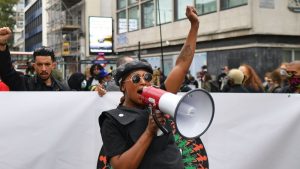
Posted on 21 March 2012 by Tim Fong
First in a series on building a new consensus.
The nation-state still matters.
Although I have met and talked with many people in OO who believe that the nation-state is obsolete, evil and must be abolished, I do not agree. There are quite a few things that the nation-state does that I have not seen as possible otherwise. Among other things, this includes the maintenance of the physical infrastructure of civilization, such as water/sewage distribution and telecom, as well as the monopoly on violence.
Water/sewage distribution takes massive physical infrastructure that has to be built and paid for over long periods of time, and you just don’t see that outside of the state system. It’s the first thing to break down after the fall of a state system (see Rome, or the various pre-Hispanic cities of Latin America, etc). These things save lives, as basic sanitation protects against cholera, and the other hygiene diseases that kill millions if unchecked. Next time you drive the Grapevine on your way to LA, think about the fact that a good portion of LA’s water also has to make that climb. It’s about 2000 feet in elevation, and the plant that does it runs 24/7. If it ever turned off, people in LA wouldn’t be able to get water anymore. To give some idea of the scale, the plant uses enough electricity to power over 600,000 normal households.
Telecom is the other big one. Even though today it is fashionable to say that wireless technology makes big infrastructure spending unnecessary or redundant, this is actually untrue. The reason that we can send email, video and tweets to people on the other side of the planet rests on an underpinning of underseas cables, satellites and giant switching stations. A good way to understand this is to go to the corner of 17th and Franklin in downtown Oakland. There, if you look up, you will see a 15 story, fortress-like building with no ground level windows, a 24 hour security presence, and massive backup electrical generators.
That is an AT&T telecom switching center, and it is hardened against nuclear blasts, civil unrest, earthquakes and power failure, as all of the major switching centers are. Buildings like this direct and channel telecommunications traffic all over the United States– almost all cell phone traffic ultimately goes through land lines, as does internet.
All of the above though, isn’t going to happen if one group does not hold a monopoly on violence. Telecom and modern water/sewage infrastructure requires a lot of maintenance, and in conflicts, those infrastructure pieces are giant targets both for scavenging (of materials) as well as to cripple opponents who depend on them. They won’t last long in a situation where the state falls and you have competing violent groups trying to vie for supremacy. I realize that the anarchist dogma is that once the evil state goes away, mutualism and horizontal practices will spontaneously arise as we all learn to work and live mutually. I’m not buying it.
I just don’t buy it, and as proof, look at the aftermath of the end of the USSR, Somalia, the dissolution of Yugoslavia, Japan’s Warring States era, and entire swathes of Chinese history. In all those situations state failure did not bring up mutualism, it created even worse, fucked up violent situations with lots of starving people. And I don’t think you can just blame “capitalism” either, it has a lot to do with the dynamics of conflict when it is not clear who is in charge and everything is constantly renegotiated. In the end it is about group on group conflict and the struggle for power. Assuming the institutions of US government and state governments vaporized tomorrow, my opinion is that what we would get is a variety of localized bosses, each with their own armies made up of former security service members and criminals. In other words, exactly the kind of people who will respect a point of process in a horizontal assembly. That is, if by respect you mean pull a trigger on an AK. Of course there are some people who want to take this even further and eliminate industrial society altogether, which is pretty ironic for people who claim to be “anti-authoritarian.” I say that because in a non-firearm situation, it is only those with the surplus food to train as warriors that are able to prevail– and subsistence agriculture or hunter gatherer existence isn’t going to provide that level of surplus calories. Firearms make killing your oppressors easier actually, since they require much less training than wielding a sword, spear or bow, all of which are difficult to use reliably without a lot of focused training. There is a reason that the European feudal nobility hated the rise of the concealable wheel-lock pistol, and one reason was that it meant a poorly trained peasant could kill a highly trained, armored, knight.
To scale back down from the macro for a moment, Occupy Oakland is a good example of the dynamics I am talking about. Despite what people claim, there is, clearly, a group of people who are more influential in the planning and execution of the various initiatives. There are also various other factions that disagree, and so there is a constant struggle for position. What there isn’t , is an explicit delineation of who these people are, nor is there a clear line of accountability. This accelerates the tension of decision making and has also led to , in my opinion, alienation of the movement from the wider population. Without clearly accountable leaders, there is no way to deal with this situation.
In his book, _Seeing Like a State_, anthropologist James Scott makes the case that state systems, by seeking to make normal human relationships explicit, use what is shown to exert power over their citizens. As an example, Scott discusses how census taking allows the state to see what normal people are doing, and then control them. As a counterpoint, in his other works, Scott offers the example of Southeast Asian hill tribes, who, he argues, have dispensed with written languages as a way of taking themselves out of the control of any of the various governments in the area, such as Burma, Thailand, Cambodia, Vietnam, etc.
But what is the state? Institutions don’t really exist outside of people, and personalities. Realistically, then the state is really a group of people who have taken power in a given area. Bound that area by some kind of racial/ideological/geographic borders, and you have the nation state. In reflecting on my experiences at Occupy Oakland with the “leaderless” anarchist ideology, because the lines of power are not clearly articulated, they are not accountable. This is the obverse of Scott’s idea. He says that not articulating local relationships makes them less vulnerable to higher authority. What I am saying is that not clearly articulating power relationships that arise _above_ makes those power relationships uncontrollable, which is to say, unaccountable. It really doesn’t matter who a person is, or how much someone professes anti-authoritarian politics– everyone under some circumstances can make bad decisions or act in ways that are negative to long-term group survival.
There is a possibility here that I will be misconstrued or misquoted, so that someone can call me a Stalinist, fascist or whatever other “ist” they’d like to use to dismiss me, so let me be extremely clear: I’m not calling for an all-powerful totalitarian state either. What I want is a nation-state to have a monopoly on violence, but still exist in a situation where that monopoly can be revoked.
If we think about the institution of the nation-state as a collection of people who are in control of a particular geographically bounded area, then it’s easy to see that some people are going to end up driving the decision cycles. The key is to be able to remove those people cleanly. And the only way to do that is to make explicit/visible their power relationships, which makes them vulnerable to everyone else. If you think about it, that’s what Julian Assange has done with Wikileaks– he made the power relationships among high level decisionmakers visible, and thus, vulnerable. That is why elements of the US government want to prosecute and execute him. That is also why what Assange has done is so valuable, because it weakens the internal connections among the powerful by making the connections vulnerable.
It isn’t enough, however, to make the connections explicit and vulnerable. There also have to be elements that sever those connections when they become harmful. This means that a nation-state absolutely must have within it independent centers of power. That means more than just separation of powers; it means that the political economy must divide the wealth/resources so that no one group can get an upper hand.
All of the above discussion does nothing, however, to discuss who exactly will live in the nation-state, specifically, the United States, and how that nation-state constitutes itself. I argue that in the current situation, those of us with leftist goals should seize the American identity for ourselves.
In this regard, the privilege discourse has been useful, because it has systematically identified the areas of cultural privilege that the white settler founders of America and their descendants took for granted, and used to exploit everyone else, including their less-propertied foot soldiers. In fact, the privilege discourse has in some places normalized a multi-ethnic society. Nowhere is this more obvious than in the Bay Area, and in the Bay Area, this is most visible in the East Bay where increasingly, no demographic group can claim outright superiority in numbers. I’m not saying that we’re living in some multi-ethnic utopia here; that’s obviously not the case. What I am saying, is that people of varying ethnic groups, barely, have figured out how to live side by side. This is no small achievement, historically.
The only reason it works, I think, is because people have a common identity as Americans that still, barely binds us together. If you look at the literature from the failure of the Yugoslavian state after the fall of Communism, you see that two things happened. First, the economy cratered. Then, various politicians appealed to long dormant ethnic/religious differentiation as a means to bound communities. Without the unifying identity of Communism, the various ethno-religious communities ended up in an all out shooting war. Clearly, Titoist Communist ideology is not what we want to be developing. Thus, I believe that we should make strong efforts to identify a distinctly leftist, multi-ethnic American identity. It can be done, as we all know, identity is socially constructed, so why not construct our own?
The alternative is to let the right continue to destroy the commons, which is what they want actually. While we’re discussing and protesting however, it isn’t happening in a vacuum. There are elements of the white nationalist right that have been organizing for years and have considerable penetration and sympathy in the security services. These people feel threatened, and this is why they are pushing their anti-gay, anti-woman agenda, complete with a home grown version of Christianity as the ideological underpinning. They would like to turn the clock back, and actually farther back than the birth of the US– they want a theocratic state that leaves much of the commons privatized. Essentially, they want feudalism. They want the state to fail too, and they’ve been succeeding since the late 1960s, when they decided that they didn’t want to have a commons if they were going to have to share it with African Americans.
The right has pretty clearly turned its back on the commons, and now ordinary white people who are not in the financial elite are discovering this for themselves as they are laid off, without benefits, and going through the foreclosure crisis. This means we have an opportunity here to seize the American identity and I say we take it.
Up next week: building the new American identity around economic justice and the balance of power.








